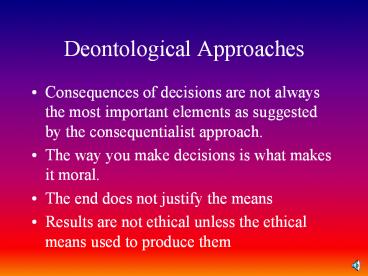Deontological Approaches - PowerPoint PPT Presentation
Title:
Deontological Approaches
Description:
Deontological Approaches Consequences of decisions are not always the most important elements as suggested by the consequentialist approach. The way you make ... – PowerPoint PPT presentation
Number of Views:143
Avg rating:3.0/5.0
Title: Deontological Approaches
1
Deontological Approaches
- Consequences of decisions are not always the most
important elements as suggested by the
consequentialist approach. - The way you make decisions is what makes it
moral. - The end does not justify the means
- Results are not ethical unless the ethical means
used to produce them
2
Kants Three Standards
- Do not make exceptions for self since everyone is
worth the same. - Let others make their own choices - treat people
as ends rather than means to an end (everyone is
equal). - Would my action pass the publicity test - would
it be adopted by rational people. Could action
be explained would it be acceptable
(grandmother test).
3
Human Rights Standard
- No action should violate fundamental human rights
- Rights - whats needed to live a life that
expresses value. - Rights - justifiable claim, entitlement or
protection against collective goals. - Liberty Rights (free speech, freedom of
conscience, self determination) Welfare Rights
(food, housing, employment, education, health
care)
4
Justice Standard
- Justice - Fair distribution of Benefits Burdens
- Which is the fair distribution standard -
equality, effort, need, accomplishment,
contribution? - We need a justice standard to show which
distribution scheme is fair in each situation.
5
Justice Standard
- Seek the standard that distributes benefits and
burdens most fairly. - Rawls method - Use veil of ignorance to decide
the rule for a just society.
6
Justice Standard
- Fair Distribution follows three principles
- Equal Liberty - max liberty compatible with
liberty of others - Difference Principle - inequities ethical if
benefit least advantaged - Equal Opportunity Principle - benefits equally
open to all.
7
Religious Ethics
- Does the action fit the central tenets of the
faith? Does the action follow the rule? - Jesus Christ Love Your Neighbor
- Buddha The Cause of suffering is desire
8
Seven-Step Process of Making Ethical Decisions
- 1. What are the Facts
- 2. What are the Ethical Issues
- 3. What are the Alternatives?
- 4. Who are the Stakeholders?
- 5. What are the Ethics of the Alternatives?
- 6. What are the Practical Constraints?
- 7. What Actions Should we Take?































